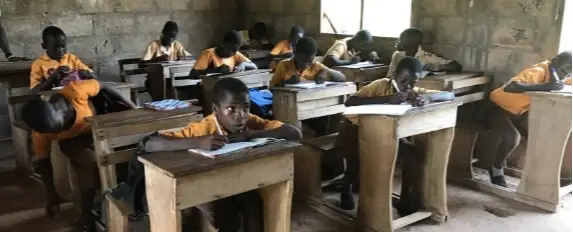Education in the Hands of Community | Lessons Learned During My Trip to Ghana

When I set off with CommonBond on its second annual trip to Ghana to see its Social Promise in action, my goal was to study how students learn in difficult situations and to explore ways rural America may learn from Ghanaian programming.
In my current work, my mission is to build industry-changing solutions to improve the American educational system because I am dedicated to seeing more students across America have access to a strong, high-quality learning environment.
The understanding I gained from this trip of how schools empower students in tough environments revolves around empowering community engagement and the importance of measuring impact. These are the lessons that Pencils of Promise (PoP), CommonBond’s non-profit partner on the ground in Ghana, taught me.
Empowering community engagement
When a new school is funded by Pencils of Promise, the local community is expected to be engaged and involved. To do this, they use an 80/20 model, wherein Pencils of Promise provides 80% of the project funding and the benefiting community pitches in the rest, typically in unskilled labor and materials (sand, stones, etc).
One of the most impactful days on the trip for me was seeing a community come together to build a new school for its children. We visited the village of Agorhome to help build the foundation of its new school. Well over 90% of the community had come out on a Saturday to contribute to building the new facility. The students welcomed us with celebratory drums and dancing, which lasted all day – meanwhile, adults and ambitious teens got to work.
Taking part in this build reminded me of the power of communities to transform education. Here we had a community lacking many resources, and yet it found the physical materials and strength necessary to build a school.
Understanding the importance of measuring impact
The part of the trip I’ll cherish most is the time we spent observing classrooms in action. We spent an entire day learning about Pencils of Promise programs, and it was an absolute inspiration to see these life-changing programs first-hand.
I saw both the lack of resources and the resourcefulness of these schools. Where a classroom only had access to a few books, teachers were clever in how they engaged students. I realized that we take books for granted in our classrooms; textbooks tend to be a given, and students have the ability to take the book home for review. That was not the case in any of the schools we visited. When you can’t take books home and don’t have other books at home, learning a language or other content is that much more difficult.
Literacy is Pencils of Promise’s primary focus. They use a globally recognized literacy assessment test called Early Grade Reading Assessment (EGRA) to evaluate how its programs are performing. In a recent report its Ghana EGRA results, Pencils of Promise saw an 18.7% increase in literacy in its 6th-grade students versus control students, as a result of its Teacher Support Program, which provides training and materials to help teachers succeed in the classroom.
They also learned that the literacy is even further boosted when teacher support is paired with the E-reader program, which equips students with electronic readers pre-loaded with 100 age-appropriate books, books that can be taken home! When we train teachers and give students non-stop access to reading materials, we can move the needle.
As I move on from the Ghana trip, I will continue to think about how technology plays a role in advancing education, starting from the most vulnerable communities. If E-readers are the answer to literacy in some of Ghana’s most under-resourced schools, could they be a solution for under-resourced schools in America?
I was inspired by the work CommonBond is doing through its Social Promise, and I hope to hear more good news about the expansion of Pencils of Promise’s efforts. All students deserve these resources that enable access to quality education. I’m proud to be a part of an organization that makes quality education possible for so many children.
About the Author: Erica Swallow is a status quo wrecker, entrepreneur, and journalist. Her thoughts have been published in Forbes, Fortune, and The Wall Street Journal, among other publications. A first-generation college student, she was raised in Paragould, Arkansas and believes education is the key to opportunity. Erica holds degrees from New York University and the Massachusetts Institute of Technology and is the founder of Southern Swallow digital strategy consultancy.

